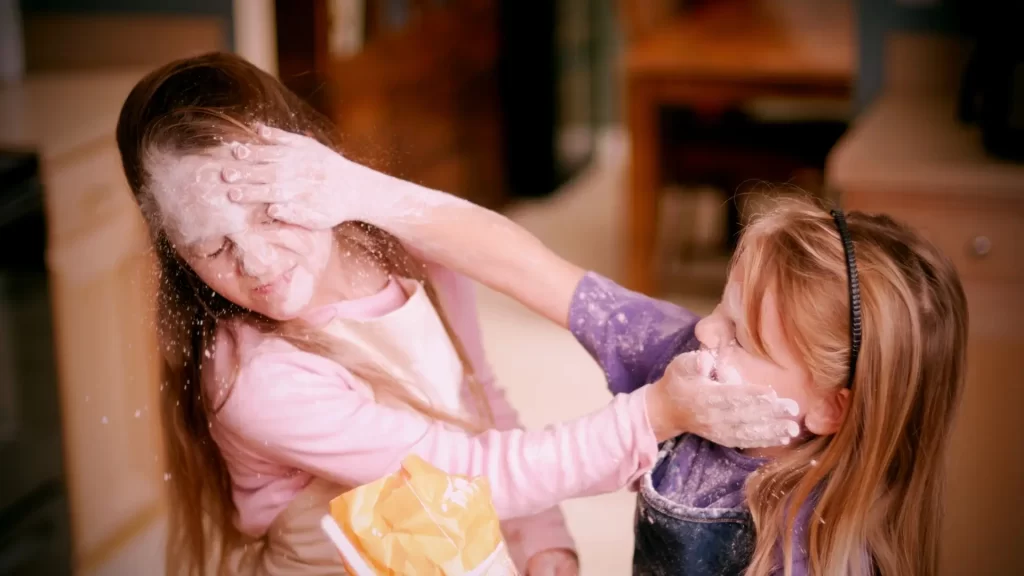
Sibling rivalry is something most parents deal with at some point. From constant bickering to feelings of jealousy and competition, it can be exhausting and even heartbreaking to watch your children fight.
But why does it happen? Are parents to blame? And most importantly, how can you handle it in a way that keeps the peace and strengthens family bonds? By exploring the right questions, we can understand the causes and find practical solutions that help kids develop essential conflict-resolution skills.
To get to the bottom of it, let’s first look at what sibling rivalry is.
Table of Contents
What Is Sibling Rivalry?
Sibling rivalry is the ongoing jealousy, competition, and conflict that naturally arise between brothers and sisters. It’s a challenge nearly all parents face when raising multiple children.
Tensions can begin as early as the arrival of a new sibling and often persist throughout childhood.
While a little bit of rivalry is normal, extreme cases can hurt kinship relationships.
Real-Life Examples of Sibling Rivalry:

Sibling rivalry isn’t just a phase—it’s a daily reality in most households. Whether it’s playful teasing or full-blown battles, it can show up in ways that parents know all too well:
- Competing for privileges – Who gets the front seat? Who picks the movie? Who gets the bigger slice of cake? The smallest wins can feel like major victories.
- Academic or personal competition – Whether it’s grades, sports, or simply getting more praise, siblings often measure their success against each other.
- Teasing and provoking – The classic eye-roll, a sarcastic jab, or mimicking every word—small actions that lead to big reactions.
- Breaking or taking belongings – From “borrowing” clothes without asking to hiding a favorite toy, possession battles can turn into full-on wars.
- Physical conflicts – A shove here, a poke there—sometimes, frustration turns into action.
- Exclusion and jealousy – Feeling left out when an older sibling gets more freedom or attention can sting, and younger siblings don’t always hide their resentment.
- Challenging opinions – Disagreeing just to get a reaction or asserting dominance in a conversation—because sometimes, winning the argument is all that matters.
Even the tiniest interactions can stir up tension, and what starts as a small disagreement can quickly snowball. Sound familiar?
Sibling rivalry is part of growing up, but understanding it is the first step to managing it.
Why Do Siblings Compete and Argue?

Several reasons can lead to sibling rivalry, including:
- Competition for Attention: Children naturally crave their parent’s attention and approval. If they feel one sibling is getting more love or praise, jealousy and rivalry can grow.
- Different Personalities: Siblings have unique temperaments, interests, and needs. These differences can cause misunderstandings or clashes.
- Age and Developmental Stages: Younger siblings might feel left out because they can’t do what their older siblings can. In contrast, older ones might feel burdened by extra responsibilities.
- Parental Influence: Sometimes, without meaning to, guardians can fuel rivalry through comparisons or favouritism.
Sibling rivalry stems from various psychological and familial dynamics, including competition for parental love and attention, birth order, and parental influence, indicating that these rivalries are a natural and complex part of sibling relationships.
But if parental influence is a factor, does that mean caregivers are always to blame?
Are Parents Responsible for Sibling Rivalry?
Not entirely, but parents do play a role. While kids’ personalities and age differences contribute to rivalry, how parents interact with one another and their kids can significantly influence sibling dynamics. Certain parenting behaviours can make things worse.
So, what exactly might parents be doing that leads to sibling rivalry without even realizing it?
How Can Parents Unintentionally Fuel Sibling Dynamics?
Parents may unknowingly contribute to rivalry through:
- Comparing Siblings: Statements like “Why can’t you be more like your sister?” can make children feel they’re not good enough.
- Unequal Praise and Criticism: Constantly praising one child or criticizing another in front of their siblings can create jealousy and resentment.
- Favoritism: Even if unintentional, showing more affection or attention to one kid can lead to rivalry.
- Gender Bias: Treating sons and daughters differently can make kids feel unfairly treated.
- Unequal Responsibilities and Privileges: Expecting the older child to be more responsible while letting the younger one get away with more—allowing them to avoid responsibilities, misbehave, or break rules without consequences—can create bitterness.
Understanding sibling dynamics, including how birth order and parental influence shape relationships, can help parents mitigate rivalry.
If parents play a role, does that mean sibling rivalry is always bad?
Is Sibling Rivalry Always Bad?

- Sibling competition isn’t inherently negative. It can be beneficial in teaching children essential life skills such as:
- Conflict resolution
- Negotiation
- Developing empathy
- These skills are crucial for personal relationships and future interactions outside the family.
- However, when rivalry escalates and becomes excessively intense, it can lead to:
- Long-term resentment
- Aggressive behavior
- Damaged sibling relationships
- Disrupted household harmony
- Understanding sibling rivalry’s underlying causes and triggers is vital for managing it effectively. By addressing these issues early on, parents can:
- Foster a more supportive and cooperative environment.
- Ensure that sibling relationships contribute positively to the family dynamic.
- Prevent ongoing tension from escalating into long-term resentment, emotional distance, or persistent clashes.
While sibling rivalry is a natural part of growing up, its intensity and impact evolve with age. Understanding when it tends to peak can help in managing conflicts before they escalate.
When Is Sibling Rivalry at Its Worst?

Sibling rivalry can start early, but it often peaks between ages 7 and 13—especially when kids are less than four years apart. At this stage, they’re old enough to compare privileges, compete for attention, and push each other’s buttons with precision.
They’re also developing stronger personalities and independence, which can lead to more frequent clashes. While younger children struggle with sharing their parents, older kids battle over fairness, recognition, and personal space.
Understanding this phase can help you step in when needed and guide them toward healthier ways to resolve conflicts.
But what makes rivalry go from normal bickering to something more serious?
What Causes Extreme Sibling Rivalry?
When tensions between siblings go beyond normal squabbles, deeper issues are often at play.
Extreme rivalry often arises when one child feels unfairly treated or less loved than their sibling. In some cases, this can escalate into sibling bullying, where conflicts become more serious. This is due to:
- Constant Comparisons: Measuring siblings against each other can fuel feelings of inadequacy.
- Financial Inequality: Unequal financial support or gifts can create resentment.
- Taking Sides in Arguments: Consistently siding with a sibling can leave the other feeling misunderstood or less valued.
- Feeling Marginalized: One child may feel overlooked or less important.
- Unequal Distribution of Attention: When one sibling consistently receives more attention, the other may feel neglected or less loved.
While extreme sibling rivalry can stem from deep-seated issues, caregivers can take proactive steps to ease tensions and create a more harmonious home. By addressing tensions early, you can prevent resentment from growing and guide children toward healthier relationships.
8 Effective Strategies to Handle Sibling Rivalry Without Losing Your Cool
Sibling rivalry is inevitable, but constant fights and competition don’t have to take over your home. As a parent, you can create a calmer environment by using these practical strategies:
1. Let Them Work It Out
Resist the urge to jump in and solve every argument. Encourage your kids to talk through conflicts on their own while staying calm. This builds problem-solving skills and helps them learn to manage disagreements independently.
2. Stay Neutral—Don’t Take Sides
Comparing siblings or assigning blame can lead to resentment. Instead of labeling one child as the “troublemaker,” address the behavior, not the person. Focus on teaching conflict resolution rather than pointing fingers.
3. Set Clear Ground Rules
Teach your kids how to express frustration without yelling, name-calling, or hitting. Establish basic house rules for respectful communication, and be consistent in enforcing them.
4. Anticipate Triggers and Plan Ahead
You know your kids best—predict what might cause tension, whether it’s sharing toys, picking a TV show, or deciding who gets the front seat. Set up fair systems, like taking turns or setting time limits, to avoid unnecessary fights.
5. Encourage Respect, Not Forced Friendship
It’s unrealistic to expect siblings to always get along. Instead of forcing closeness, emphasize the importance of mutual respect. Over time, a stronger bond may naturally develop.
6. Give Each Child Individual Attention
Sibling rivalry often stems from feeling overlooked. Make sure each child gets one-on-one time with you, so they don’t feel the need to compete for your attention.
7. Teach Emotional Regulation
Help your kids recognize and manage their emotions in healthy ways. Encourage them to express feelings through words rather than outbursts and guide them in calming techniques like deep breathing or taking a break.
8. Model Healthy Conflict Resolution
Kids learn by watching you. Show them how to handle disagreements calmly and respectfully, whether it’s with your partner, a friend, or even them.
By applying these strategies, you can reduce sibling rivalry, create a more peaceful home, and help your kids develop lifelong conflict-resolution skills.
But does sibling rivalry ever disappear, or does it continue into adulthood?
Does Sibling Rivalry End When Kids Grow Up?

For many siblings, rivalry softens with time, giving way to mutual respect and understanding. But for others, old wounds don’t simply fade—they linger, growing more complex with age.
Unresolved childhood tensions can quietly follow them into adulthood, shaping interactions, straining bonds, and, if left unchecked, creating lasting stress in their relationships.
But Why Do Adult Siblings Still Compete?

- Unresolved Childhood Issues: Grown-up sibling rivalry is often a continuation of unresolved issues from one’s early years or the emergence of new challenges that arise in adulthood. Old grudges, past hurts, or lingering family roles can resurface over time, leading to tension and emotional distress. These unresolved emotions may make it difficult for siblings to move forward and build healthier relationships.
- Family Roles: Roles established during one’s formative years—such as being labelled as “the smart one” or “the troublemaker”—often persist, influencing how siblings interact and perceive each other as grown-ups.
- Firstborn children, in particular, may continue to grapple with expectations of responsibility and leadership within the family dynamic.
- Financial Disputes: Disputes over inheritance or financial support can create lasting rifts among adult siblings.
- Lifestyle Differences: Differences in lifestyles and values, such as divergent career paths or parenting styles, can lead to conflicts.
- Parental Influence: Parental influence remains a significant factor; ongoing favouritism or interference from parents can keep old conflicts alive and well.
These complex issues can be challenging and painful but are not insurmountable. Understanding the root causes of adult sibling rivalry is the first step toward healing and rebuilding relationships.
But How Can Adult Brothers and Sisters Heal Their Broken Bonds?

Rebuilding sibling relationships takes effort, patience, and the right approach.To foster reconciliation, mature siblings can heal their relationships with conflict resolution skills:
- Engage in Open Communication: Engage in open and honest communication to address unresolved issues.
- Communicate with Empathy: Listen to understand each other’s perspectives rather than respond.
- Set Healthy Boundaries: Establish personal limits to maintain respect and avoid unnecessary conflicts.
- Seek Professional Help: Seek professional help, if necessary, such as counselling services, to provide a safe space for working through issues.
- Organize Family Meetings: Meetings can provide a structured environment for addressing conflicts, allowing everyone to express their thoughts and collaboratively find solutions.
By taking these steps, siblings can move past rivalry and reconnect, transforming their relationships into sources of support and friendship.
Sometimes, even the best efforts don’t work. When is the time to get outside help?
When Should You Get Help for Sibling Rivalry?
The straightforward answer: when you can’t handle it on your own.
If sibling rivalry is causing serious emotional distress, impacting mental health, or leading to long-term relationship damage, it may be time to seek professional help. Signs to watch for include:
- Constant Fighting or Aggression: When conflicts turn violent or become emotionally abusive.
- Signs of Anxiety or Depression: If one or more siblings show signs of mental health struggles related to the rivalry.
- Complete Breakdown of Communication: When siblings refuse to talk or interact with each other at all.
In these cases, seeking help from a family therapist or counsellor can be the best step forward.
Final Thoughts: Turning Rivalry into Connection
Sibling rivalry is normal growing up, but it mustn’t be destructive. By creating opportunities for the whole family to bond and have fun together, and by understanding why it happens and taking steps to reduce jealousy and competition, parents can help their kids build strong, loving bonds.
For grown-up siblings, healing is possible through honest conversations, setting healthy boundaries, and letting go of old resentments.
Sibling relationships can be complicated, but they can also be among life’s most meaningful and lasting connections. With patience, love, and understanding, tension can be transformed into support and friendship.
How Avocado Health Helps You Manage Sibling Rivalry?
Avocado Health offers expert-backed, text-based parent coaching to help you navigate sibling conflicts with confidence.
With real-time personalized support, you’ll learn practical strategies to reduce rivalry, foster cooperation, and strengthen sibling bonds—creating a more peaceful and connected family dynamic. Start your journey to a calmer home today!
Dad of 5. CEO & Co-Founder of Avocado Health. Former HealthTech & FinTech Founder. Passionate about empowering families and driving change in parenting and child development.

